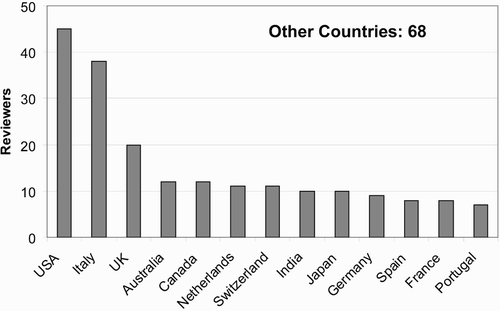The Editor hopes that all JHR readers have had an enjoyable start to the New Year and wishes you all the best for 2010! I look forward to another exciting year with the Journal, and a successful collaboration with the Editorial Board, the Authors and the Reviewers.
Status of JHR
The Journal of Hydraulic Research (JHR) strengthened its position as an internationally relevant journal during the past year with a doubling of the Impact Factor to 0.883. Although the Journal is doing well, further improvements are planned for 2010, particularly relating to the Journal management. Following an agreement between IAHR and Taylor & Francis (T&F), Oxford UK, T&F has taken over the publishing of IAHR journals (on behalf of IAHR) from 1 January 2010. T&F is a well-known journal (and book) publisher, and will be responsible for further improving the production (especially using the Informaworld platform) and marketing of both IAHR journals, namely JHR and the International Journal of River Basin Management. All IAHR Members further profit from this change through free online access to all JHR papers published from Volume 1 in 1963, downloadable from the IAHR website. An article describing in more detail the benefits of our new relationship will shortly be published in HydroLink, which will continue to be published as a supplement to JHR!
The first JHR Best Reviewer Awards were presented during the Vancouver IAHR World Congress in August 2009. This award is mainly directed to excellent work by younger Reviewers of papers submitted to JHR, to highlight their importance in the peer-review process. Without the devoted work of these Reviewers the peer-review paper process would not be possible. However, I would also like to acknowledge the support of all the JHR Reviewers and my commitment to publish annually the List with names. shows the geographical origin of the current Reviewers. It may be noted that most Reviewers originate from the USA, followed by Italy and the United Kingdom. A number of countries provide around 10 Reviewers each. Altogether, our Reviewers originated from 39 countries, spanning mainly Europe, North America, Australia and Asia. 142 of a total of 269 Reviewers originate from Europe. Note that several Reviewers made a number of reviews, but are listed only once.
From 1 January to 30 November 2009, a total of 192 papers were submitted, of which 63 or one-third were invited to be withdrawn, for reasons explained in previous Editorials. The rest went through the standard review process, with a total of 25 so far declined. It should be noted that for a total of 34 submissions the first review round is not yet completed, and that 7 papers are in the meantime accepted for publication. All submissions go at least through two review rounds, lasting on average some 10 weeks. There are exceptions where the review process lasts more than 3 months, for reasons mainly related to the response of the assigned Reviewers. In general, three reviews are provided for each submission, but two reviews are considered acceptable if the third has not arrived in 3 months. The Editorial Board just would like to invite all Reviewers, who often are also Authors of JHR papers, to keep within the 2 months period for their review. I am sure that sometimes an additional gentle reminder can work wonders…
Editorial Board
The JHR Editorial Board has undergone another change. Prof. Dr. Marco Tubino, University of Trento, Italy, has decided to step down from the Board after 5 years. He was particularly interested in water-sediment modeling of river systems, and sediment transport in general. I would like to thank him for his great services rendered to JHR.
A new JHR Associate Editor, Prof. Dr Bijan Dargahi, from the Royal Institute of Technology, Stockholm, Sweden () has joined the Editorial Board. He is known for his studies in hydraulic engineering in general, and in particular for his work in scour hydraulics. After graduating as a civil engineer from the Polytechnic of Central London in 1976 he conducted post-graduate studies in hydraulic engineering at the International Institute of Hydraulic Engineering, Delft, The Netherlands from 1978. Dr Dargahi submitted his PhD thesis to the Royal Institute of Technology, Stockholm, in 1988, and was subsequently appointed as Lecturer in hydraulic engineering in 1993. Since 2003 he has been professor in this field. Dr Dargahi's research interests are hydraulic structures, sediment transport and scour including 3D boundary layer flows, river engineering, and large-scale hydrodynamic water quality modelling in lakes and the sea. He will particularly help to develop authorship from the Scandinavian countries which are currently under-represented in JHR. I would like to wish Dr Dargahi all the best for this delicate position.
Professional information on and the technical interests of all JHR Associate Editors is available at the JHR homepage http://www.journalhydraulicresearch.com/.
In conclusion, the Journal of Hydraulic Research undergoes further changes to the benefit of all involved. In the name of the IAHR Council and the Editorial Board, I would like to thank all JHR Readers, Reviewers and Authors for your constant support. Please feel free to contact me for additional information or proposals.
Willi Hager, JHR Editor January 2010

